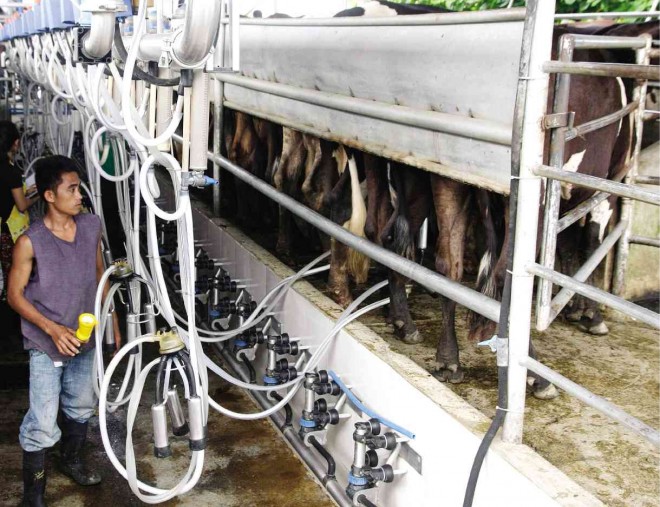
UBAY Dairy Multiplier Farm in Bohol province is considered one of the biggest milk stations in Central Visayas. The farm currently has 355 dairy cows that produce 510 liters of milk per day. CONTRIBUTED PHOTO
MANDAUE CITY, Cebu—Lack of water delayed the completion of a milk processing plant in a town in Bohol province that is said to have been funded by proceeds from the government share of the Malampaya gas project in Palawan province.
An official of the National Dairy Authority (NDA) in Central Visayas said the agency, which is under the Department of Agriculture (DA), was addressing the water shortage but was unable to finish the plant in time as a result.
Farina Dy, NDA regional information officer, said other facilities in the plant, called Dairy Multiplier Farm in Barangay Calanggaman in Ubay town, Bohol, were already in place.
These include areas for milking cows, feeding the animals, rooms for plant staffers and wells from which to draw water.
But even if the plant has not yet been completed, Dy said it had been producing 510 liters of milk per day since it started operating in 2012.
The milk is processed manually and sold to bakeshops in Ubay and walk-in customers from Bohol.
Customers, according to Dy, buy milk from the farm even if it is at least 115 kilometers from the Bohol capital, Tagbilaran City, because it is the only one in the province.
The Inquirer, in an earlier article, quoted a Commission on Audit (COA) report saying the NDA had not finished the dairy farm project but had received P160 million in funding from the so-called Malampaya Fund.
The COA report was quoted as saying the project should have been implemented within a year from the date of the memorandum of agreement signed by the NDA with the DA on Nov. 25, 2009.
Project proponents, however, sought two deadline extensions—one in 2012 and another in 2013. They cited prolonged drought brought by El Niño as reason for the project delay.
Dy said the NDA had to seek help from the University of San Carlos’ Water Resource Center to build shallow wells in the farm.
Facility chief Jonathan Ampo said that since water is not easily available in the 120-hectare dairy cow pasture farm, workers had to build two ram pumps to get water flowing into the facility.
In 2010, Dy said 102 cows were bought from New Zealand at P146,000 each. The purchase was taken from the P160 million allocated for the farm.
The facility now has 355 cows. “The money is here with the agency …. Some have been spent but there is still a balance,” she told Inquirer.
Dy, however, said she didn’t have the details because the records were kept at the DA central office in Quezon City.